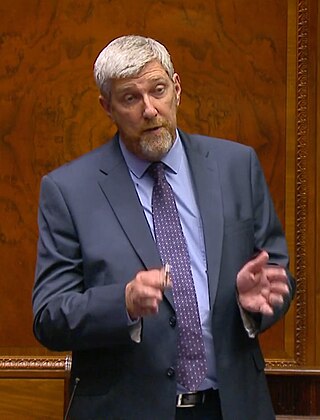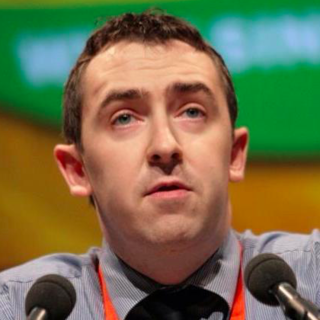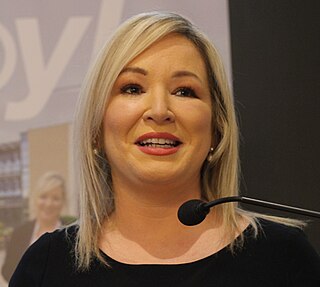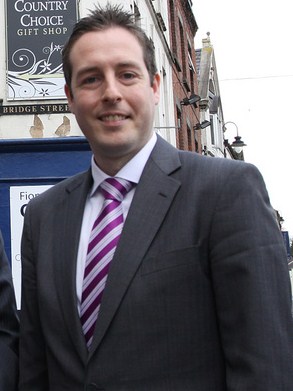Related Research Articles

The Democratic Unionist Party (DUP) is a unionist, loyalist, British nationalist and national conservative political party in Northern Ireland. It was founded in 1971 during the Troubles by Ian Paisley, who led the party for the next 37 years. Currently led by Jeffrey Donaldson, it is the second largest party in the Northern Ireland Assembly, and is the fifth-largest party in the House of Commons of the United Kingdom. The party has been described as centre-right to right-wing and socially conservative, being anti-abortion and opposing same-sex marriage. The DUP sees itself as defending Britishness and Ulster Protestant culture against Irish nationalism and republicanism. It is also Eurosceptic and supported Brexit.

The Northern Ireland Assembly, often referred to by the metonym Stormont, is the devolved legislature of Northern Ireland. It has power to legislate in a wide range of areas that are not explicitly reserved to the Parliament of the United Kingdom, and to appoint the Northern Ireland Executive. It sits at Parliament Buildings at Stormont in Belfast.

Sir Jeffrey Mark Donaldson is a British politician who has served as leader of the Democratic Unionist Party (DUP) since June 2021. He has been the Member of Parliament (MP) for Lagan Valley since 1997, and leader of the DUP in the UK House of Commons since 2019. As of 2022, he is Northern Ireland's longest-serving MP.

Peter James Weir, Baron Weir of Ballyholme is a Democratic Unionist Party (DUP) politician who served as Minister for Education in the Northern Ireland Executive from 2016 to 2017 and from 2020 to 2021. Weir was the first non-Sinn Féin legislator to head the Department of Education since the department came into existence on 2 December 1999.
Integrated education in Northern Ireland refers to the bringing together of children, parents and teachers from both Roman Catholic and Protestant traditions in childhood education: the aim being to provide a balanced education, while allowing the opportunity to understand and respect all cultural and religious backgrounds.

John Fitzgerald O'Dowd is an Irish Sinn Féin politician. He was a Member of the Northern Ireland Assembly for Upper Bann since 2003. He was previously the Minister for Infrastructure from May to October 2022 and the Minister for Education in the Stormont Executive from 2011 to 2016. He briefly took on the duties of deputy First Minister in 2011 while Martin McGuinness ran in the 2011 Irish presidential election.

The 2007 Northern Ireland Assembly election was held on Wednesday, 7 March 2007. It was the third election to take place since the devolved assembly was established in 1998. The election saw endorsement of the St Andrews Agreement and the two largest parties, the Democratic Unionist Party (DUP) and Sinn Féin, along with the Alliance Party, increase their support, with falls in support for the Ulster Unionist Party (UUP) and the Social Democratic and Labour Party (SDLP).

Caitríona Ruane is a Sinn Féin politician who served as the Principal Deputy Speaker of the Northern Ireland Assembly from 2016 to 2017, and was a Member of the Northern Ireland Assembly (MLA) for South Down from 2003 to 2017.

Daithí Gerard McKay is a newspaper columnist and former Irish politician. He was the Chair of the Finance Committee in the Northern Ireland Assembly and a Sinn Féin MLA for North Antrim for 9 years. He brought forward legislation that led to the introduction of a Carrier Bag Levy in Northern Ireland and the abolishment of rates for Community Amateur Sport Clubs.

Michelle O'Neill is an Irish politician who served as deputy First Minister of Northern Ireland between 2020 and 2022. She has been serving as Vice President of Sinn Féin since 2018 and is the Member of the Legislative Assembly (MLA) for Mid Ulster since 2007.

Trevor Lunn is an independent politician in Northern Ireland and former member of the Alliance Party.

The Traditional Unionist Voice (TUV) is a unionist political party in Northern Ireland. In common with all other Northern Irish unionist parties, the TUV's political programme has as its sine qua non the preservation of Northern Ireland's place within the United Kingdom. A founding precept of the party is that "nothing which is morally wrong can be politically right".
Same-sex marriage has been legal in Northern Ireland since 13 January 2020, following the enactment of the Northern Ireland Act 2019. The first marriage ceremony took place on 11 February 2020. Civil partnerships have also been available for same-sex couples in Northern Ireland since their introduction by the Government of the United Kingdom in 2005.

Paul Jonathan Givan is a Unionist politician from Northern Ireland representing the Democratic Unionist Party (DUP). Givan served as First Minister of Northern Ireland from June 2021 to February 2022, the youngest person to hold that office. Givan is the DUP's Spokesperson for Health.

The 2005 United Kingdom general election in Northern Ireland was held on 5 May 2005 and all 18 seats in Northern Ireland were contested. 1,139,993 people were eligible to vote, down 51,016 from the 2001 general election. 63.49% of eligible voters turned out, down 5.1 percentage points from the last general election.

The 2017 Northern Ireland Assembly election was held on Thursday, 2 March 2017. The election was held to elect members (MLAs) following the resignation of deputy First Minister Martin McGuinness in protest over the Renewable Heat Incentive scandal. McGuinness' position was not filled, and thus by law his resignation triggered an election.

The Renewable Heat Incentive scandal, also referred to as RHIgate and the Cash for Ash scandal, is a political scandal in Northern Ireland that centres on a failed renewable energy incentive scheme that has been reported to potentially cost the public purse almost £500 million. The plan, initiated in 2012, was overseen by Arlene Foster of the Democratic Unionist Party (DUP), the then-Minister for Enterprise, Trade and Investment. Foster failed to introduce proper cost controls, allowing the plan to spiral out of control. The scheme worked by paying applicants to use renewable energy. However, the rate paid was more than the cost of the fuel, and thus many applicants were making profits simply by heating their properties.

The 2022 Northern Ireland Assembly election was held on 5 May 2022. It elected 90 members to the Northern Ireland Assembly. It was the seventh assembly election since the establishment of the assembly in 1998. The election was held three months after the Northern Ireland Executive collapsed due to the resignation of the First Minister, Paul Givan (DUP), in protest against the Northern Ireland Protocol.

The Identity and Language Act 2022 is an Act of the Parliament of the United Kingdom providing "official recognition of the status of the Irish language" in Northern Ireland, with Ulster Scots being an officially recognised minority language.

The Northern Ireland Protocol Bill 2022–23 was a proposed Act of the Parliament of the United Kingdom that sought to unilaterally override parts of the Northern Ireland Protocol (NIP). The NIP is the part of the Brexit withdrawal agreement that governs some aspects of trade in goods between Northern Ireland and Great Britain, as well as between Northern Ireland and the European Union. The bill was introduced to address what the government call 'unacceptable barriers to trade' that the protocol introduced within the UK internal market. The bill was criticised by most members of the Northern Ireland Assembly, by the European Commission, and by member states of the European Union. It was characterised in the UK and abroad as a breach of international law.
References
- 1 2 "Assembly passes integrated educational bill after UUP refuses to back petition of concern". RTÉ News. 9 March 2022. Retrieved 10 March 2022.
- 1 2 "The Northern Ireland Assembly". www.niassembly.gov.uk. Retrieved 27 March 2022.
- 1 2 3 "Integrated education: Lagan College backs new bill". BBC News. 17 February 2022. Retrieved 10 March 2022.
- 1 2 3 4 5 6 "Sinn Fein blasts DUP integrated education petition of concern bid a 'shameful stunt'". ITV News. 8 March 2022. Retrieved 10 March 2022.
- 1 2 3 4 5 6 7 8 "Integrated schools defended by Alliance after Sinn Féin criticism". BBC News. 8 July 2021. Retrieved 10 March 2022.
- ↑ "NI Assembly passes integrated education bill". ITV News. 9 March 2022. Retrieved 10 March 2022.